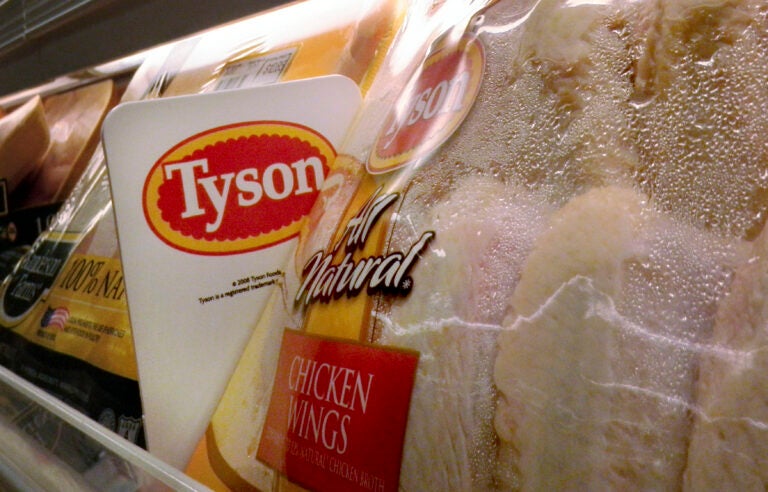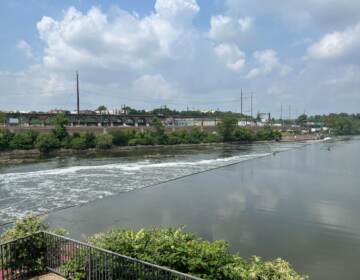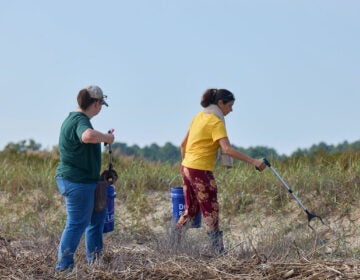Report: Pa. chicken plant pollutes waterways with millions of pounds of nitrogen, phosphorus
A Tyson Foods plant in Lancaster County is one of several Tyson plants that researchers say discharged pollutants by piping wastewater into waterways.
Listen 1:16
File - In this May 3, 2009 file photo, Tyson Foods chicken products are displayed on the shelves of a Little Rock, Ark. grocery store. (AP Photo/Danny Johnston, File)
From Philly and the Pa. suburbs to South Jersey and Delaware, what would you like WHYY News to cover? Let us know!
A Tyson Foods plant in New Holland, Lancaster County, released more than 38 million pounds of pollutants into local waterways between 2018 and 2022, according to a report by the Union of Concerned Scientists.
The facility is one of several Tyson meat and poultry processing plants in the U.S. that researchers say discharged pollutants, such as nitrogen and phosphorus, by piping wastewater into streams, rivers, lakes and wetlands.
Tyson Foods released more than 371.7 million pounds of pollutants nationwide over four years, according to the study, which relied on effluent data reported by the U.S. Environmental Protection Agency.
“We were not expecting pollution at that level to almost go unchecked and be given a free pass to pollute,” said researcher Omanjana Goswamim. “That is an insane amount of wastewater to pipe into clean surface water sources and contaminate pristine waters that people use for recreation, and that are home to flora, fauna, aquatic plants and animals, and are often habitats for endangered species.”
Tyson Foods did not immediately respond to requests for comment.
Meat and poultry processing plants produce wastewater when they wash animals, meat and equipment. The wastewater is taken to treatment plants, sprayed onto fields or piped into waterways. Often, contaminants impact water quality for aquatic species and can seep into groundwater that makes its way to peoples’ taps.
Tyson Foods’ New Holland plant, which is part of the Mill Creek watershed that flows into the Chesapeake Bay, discharged millions of pounds of nitrogen and phosphorus over four years.
These contaminants can significantly increase algae, which can impact water quality, food resources and habitats and decrease oxygen that fish rely on to survive.
Pollutants from wastewater can also impact drinking water supplies. Exposure to high levels of nitrates, a form of nitrogen, in drinking water has been linked to some cancers, as well as blue baby syndrome among infants.
Nitrates from animal waste have impacted drinking water supplies in several rural communities across the U.S. Private wells have been particularly impacted because they are not regulated under the Safe Drinking Water Act.
In 2018, Delaware residents filed a lawsuit against chicken producer Mountaire, which was accused of spraying contaminated wastewater from a failing treatment system onto a nearby field, seeping nitrates into private well water for nearly 20 years. The lawsuit led to a $65 million settlement in 2021.
The Union of Concerned Scientists is urging the EPA to impose stricter limitations on wastewater discharges to waterways. The EPA has proposed to amend its effluent regulations that would impose stricter limitations on nitrogen pollution and place limits on phosphorus for the first time.
“There are limits imposed with the Clean Water Act, and the level at which these Tyson plants have been polluting… is actually pretty well within the limits — not always. There are some exceedances, but not a lot,” said researcher Stacy Woods. “So, what we’re looking at here is, really, permission to pollute at these levels, which is mind-blowing.”
The researchers also advocate for changes to the Farm Bill, which critics say pays the agricultural industry to pollute and allows large corporations such as Tyson to monopolize the industry.
“These huge megacorporations like Tyson Foods… are just telling us exactly what they’re putting into our waterway — and that is allowed,” Woods said. “And we know that there are environmental and human health risks with so many of these pollutants.”

Get daily updates from WHYY News!
WHYY is your source for fact-based, in-depth journalism and information. As a nonprofit organization, we rely on financial support from readers like you. Please give today.







